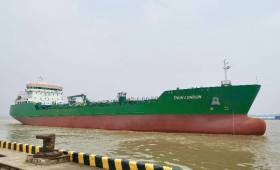Displaying items by tag: Brand new tanker
Brand New Chinese Built Tanker for Swedish Lake Based Shipping Group Arrives in Dublin Port
A brand new Chinese built Dutch flagged tanker ordered by a Swedish lake based shipping group arrived into Dublin Port from Wales this morning, writes Jehan Ashmore.
The L-class leadship Thun Lidkoping is the first of five 18,650 deadweight chemical product tankers which was completed by Avic Dingheng Shipbuilding Ltd in China.
The name chosen for the leadship operated by Thun Tankers (Erik Thun Group), derived from the shipowner group's inland homeport of Lidköping located on the southern shores of Lake Vänern. This is the third largest lake in Europe which is connected to the sea by shipping canals.
The L-class each with a cubic capacity of (98%) 20,665 m3, have a design developed in-house using Erik Thun AB's long experience of building sustainable, high quality vessels that operate as a major player in northern Europe.
In terms of environmental care, a concerted focus has been made with new regulations and customers’ needs taken into the key design and building process of this new class type.
The 148m tanker along with second sister, Thun London which too was delivered recently, operate in the Gothia Tanker Alliance network while crewing and technical management is conducted through MF Shipping Group.
This morning's arrival in Dublin Bay of Thun Lidkoping from Milford Haven, Wales, also involved Afloat to track a passing fleetmate, Thun Gemini which had departed Dublin Port having docked at Oil Berth No.1. It was at the adjacent berth that Thun Lidkoping berthed, though the maiden call of the newbuild tanker took place at the Irish port only last month.
As for Thun Gemini, the smaller G -Class tanker is returning to the same south Wales port which saw a passage offshore of Dun Laoghaire Harbour where Afloat reported of the tanker's once-off call to enable maintenance carried out at the south Dublin Bay port.
Such a call by the 2003 built 4,100dwt tanker was notably a rare occurance for such a vessel type which as previously reported took place three decades ago.





























































